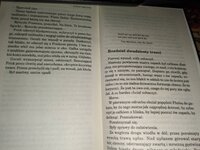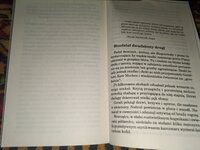Quence
obnoxious faggot
i know if nobody else reads my textwalls, you do, to cry abt them
i know if nobody else reads my textwalls, you do, to cry abt them
am enjoying it so far. after the intro there's a lot of groundwork laying out how the industry got started in the area before all the fun stuff.>look it up
>it's the rockefellers
anyways added to my reading list
Key Words: temporal, sentience, perceptual, cognition, creation, autonomy…Well personally I've been enjoying The Never Ending Story...
Writing it.
it's always like this with these elitist corpo types, regardless of whether it's the (slave) ownership mentality or (naive) utopianist mindset.i've always found it insanely condescending when a business owner refuses to pay their employees more but then spends millions building housing/schooling/etc that they don't want that doesn't reflect the reality the workers live in n then shocked pikachu face
Nothing wrong with that. A common language unifies a country and provides its citizens opportunities for success.company town schools were meant to encourage "appropriate" childrens' behavior, etc (learning english and american identity/indoctrination as a lot of miners were greeks n variety of slavs, etc).
 .
.I swear and vow by moon and stars,And sun that shines so early!If I had twenty thousand lives,I’d die as aft for Charlie.

machiavelli's infamous The Prince: in english, this one seemed to me like a basic primer to american politics (aka how to be a duplicitous, self-righteous, greedy sack of shit and get away with it). Robert Greene took notes and dialed it up to 10 in The 48 Laws of Power.*snip*
Funnily enough, churches and missionaries actually played a pretty large part in how the Hmong were treated in the aftermath of the war. They were more often christian then ethnic Lao, so they were labelled as "westernized" and pretty heavily discriminated against all because French missionaries were able to convert more of them. Actually led to a genocide, since the Pathet Lao needed someone to blame.machiavelli's infamous The Prince: in english, this one seemed to me like a basic primer to american politics (aka how to be a duplicitous, self-righteous, greedy sack of shit and get away with it). Robert Greene took notes and dialed it up to 10 in The 48 Laws of Power.
Laos/'nam/bomb everything: i had no idea about the carpet bombing in laos, though im not surprised one bit. i would argue that lessons actually were learned, (((big money))) learned they could make crazy bank if they could convince US gov to turn innocent and defenseless third world countries into backyard barbeque with overpriced fireworks. so, while military corpos were making bank selling bombs and missiles, (((NGOs))) and (((church orgs))) suddenly found themselves flush with lots of free money to help those poor foreigners trying to escape some "war-torn hellscape that definitely wasn't america's fault for being created, for realsies" to be resettled in some random bourgiousie western country that's nearly opposite their native culture and religion.
AAA YOU READ ITAfter that was the Voices from the Plain of Jars
yepp, it was absolutely soul crushing especially the parts written by kids and teens but it's important that this book was publishedAAA YOU READ IT
It was such a horrifying read. I have no clue how Kissinger managed to delude himself into thinking that tons upon tons of bombs being dropped on a country would make a people want to assimilate into a capitalist nation.
No problem! Its fun to have people read the shit I recommend. Also a little more background: iirc, this was the first book published about the war/the first book that revealed its extent, since everything was still under raps at the time.ma
yepp, it was absolutely soul crushing especially the parts written by kids and teens but it's important that this book was published
thanks again for the recommendation stoner
kissinger was a globalist kike playing everyone off each other. the blotchy old gremlin in his last days admitted he regretted empowering china.AAA YOU READ IT
It was such a horrifying read. I have no clue how Kissinger managed to delude himself into thinking that tons upon tons of bombs being dropped on a country would make a people want to assimilate into a capitalist nation.
Standard slopi've read bunch of shit over the past week or two. after reading Zarathustra twice i needed some fictions so i read Good Omens by Pratchett and Gaiman, it's super funny, written relatively early in both men's careers and you can see a lot of ideas that would later return in both of their works, seems bit unpolished at times but i still recommend it to anyone who's a fan of either.
Boring slopReread the Prince in polish, because the foreword got me believing Hitler read the book before he went to sleep, still not impressed but some of the pragmatic stuff will be internalized. Yatta yatta be nice to those too week to oppose you so they don't form a critical mass of opposition, destroy those who are strong. Conquer nations with cultural victories if you can, military intervention is the worst idea ever, maybe someone in US senate could actually learn something from this book.
Propaganda slopAfter that was the Voices from the Plain of Jars, redpilled me on war in Laos, the horrifying amounts of war crimes the US committed in white gloves by being able to claim "we have no troops on the ground" while dropping "an annual average of 129,482 tons in 1965–68 to an average of 387,466 tons per year in 1969–72" OF FUCKING BOMBS. Not only the US gov refused to clean up their mess but they also kept using the same tactic in every conflict ever since, Syria, Afghanistan, you name it, in no lesson learned other than "we can bomb countries into inhabitable shitholes". Around 1/3 of the book are drawings and first hand accounts by Laotian locals, they hit really hard, especially drawings done by kids as young as 12, the author and his friend risked their lives to smuggle the drawings from refugee camps, the book got published when the case was still recent but mostly ignored because the public was too busy with Vietnam, some aid been given over the years but pretty much none of it went to clean up the damages. Absolute shitshow.
Wop slopIn the same poetic streak i picked up Alighieri's Divine Comedy, still going through it comparing various translations in two different languages and the original with my limited knowledge of medieval italian. It's a very fun read especially for a medievalist, i can see how it codified a lot of ideas about afterlife in common consciousness of The West for centuries to come. I'd recommend it but at this point i can't decide which of the english translations is my favourite, will update later.
Polack slopNow i'm gonna try and read some polish poetry and picked up book of essays by Koneczny, hopefully it will indeed teach me how to save the latin civilization.
this was a true delightgary gerstle's "the rise and fall of the neoliberal order"
seemed like a solid econ history book
My parents were the exact same way during the Iraq fiasco. Blindly believing in the WMD charges and somehow thinking Saddam was connected to 911 without any evidence pointing to it. You can better believe major oil companies took advantage of all the chaos.this was a true delight
getting a physical copy soon
the introduction talks about how the great depression and how the 'new deal order' came about and what laws/agencies were passed to create fiscal stability for the populace (glass steagall, the sec, etc)
this book has definite echoes with others i have read (when it spoke of the marshall plan to invest in other countries to keep them liberal so they would not turn to the soviet sphere of influence i was reminded of when scheidel mentioned this technique in great leveler, and the author talks about quinn slobodian's globalists, and with the financial deregulation i was repeatedly reminded of eichengreen's hall of mirrors)
there is also mention of the moral majority and how the religious right picked up this neoliberal deregulation mentality, which echoed of kevin kruse's one nation under god.
there is a great joy in bookworming so much on a topic that a random purchase fills in gaps and ties into other works.
the book states a lot of conclusions i already reached and some which i had said before: the fear of communist overthrow abroad led to huge worker gains here and in some other countries via the marshall plan (social security, welfare state, etc). gorbachev was a bitch and the collapse of the soviet union and its challenge to the capitalist system meant that western politicians didn't even have to try to care anymore, reagan was evil (u.s. started heavily increasing the military budget year after year to "protect the free market" while he was in office). there was a bank deregulation for savings accounts and then like, a bailout right after but nah reagan didn't put 2 n 2 together. the author talks about the "new left" centering around identity politics starting with boomers and nader. when clinton got into office, instead of pushing back against reagan's de-regulation he ran with it and moved the dem party from left to center (and every dem president after has scooted further to the right). this pissed off republicans so hard because they wanted to make deregulation THEIR identity and how dare clinton deregulate better tham them and they basically stole the 2000 election (the race was close, florida was ran by jeb bush n the count in that state was fucky, the supreme court ordered the recount to stop)
one of the more infuriating parts was about bush's "nation building" in iraq. i remembered this shit growing up. i remembered coming home from school and arguing with my mom about how iraq was not tied to al qaeda at all and her mainstream media consuming ass replying "if they weren't then why we wouldn't be invading them" and them never finding any wmd's. the nepo baby in office never had an after plan after bombing the fuck out of the country. just "the market will take care of it" after and then passed it over to contractors after banning former ba'ath party members from being in charge of anything (which left large amounts of the citizenry unhireable... so halliburton n a bunch of mercs n private contractors just used it as a wealth funneling scheme. 90% of u.s work in the middle east is just a fucking wealth funneling scheme. imagine my shock getting home today n seeing a post from spectator index that the new syria administration is opening the economy for investors. they're gonna bulldoze historic damascus and put a fuck ugly modernist strip mall with an apple store n a mcdonalds)
i am starting steven johnson's the infernal machine tomorrow. kind of excited. i have read ghost map by him before, which is about the london cholera outbreak. he's a good writer.
